Director: Woo Min-Ho
Cast: Lee Byung-Hun, Cho Seung-Woo, Baek Yoon-Sik, Lee Kyoung-Young, Kim Hong-Fa, Jo Jae-Yun, Bae Sung-Woo, Kim Dae-Myung, Jo Woo-Jin, Yoo Jae-Myung
Running Time: 180 min.
By Paul Bramhall
Based on a web-comic by Yoon Tae-ho, who was also responsible for the web-comic behind the excellent Moss, when Inside Men hit Korean cinema screens in 2015, its tale of political corruption strongly resonated with audiences, making it one of the most successful movies of the year. The news that director Woo Min-ho had shaved 50 minutes off the movies original 3 hour run-time, in order to have a wider theatrical distribution, soon had fans requesting that the director’s cut should also have a chance to be seen on the cinema. It was a request that quickly gained momentum, and by the end of the year, the full 3 hour version was also given a theatrical run, under the moniker of Inside Men: The Original.
For full disclosure, I’ll confess to not having seen the trimmed down theatrical version of Inside Men, so I’m unable to do a comparison of the two. Having watched Min-ho’s original vision in its entirety, there’s something about human nature which leaves me with no inclination to watch a version with any of the wonderfully dark story forcibly left on the cutting room floor. With that being said, when I first came across the production, despite featuring an impressive amount of talent in front of the camera, the news that it was being directed by Min-ho was enough to make me give it a pass all together. Prior to Inside Men, Min-ho’s filmography consisted of 2 titles – Man of Vendetta and Spy – a pair of movies which were both painfully misguided and equally painful to watch. With Memories of the Sword already taking the 2015 prize at proving that a talented cast in front of the camera, doesn’t make up for a lack of talent behind it, I wasn’t going to hold my breath.
Thankfully though, it turns out that while in some cases an excellent cast can get dragged down to the level of a poor director, the flip side of the coin is that a (so far) poor director can be elevated to the level of his excellent cast. This is very much the case with Inside Men, as the end product is one that sees everyone involved working in synchronicity with each other. The cast is somewhat of a reunion for actors Jo Seung-woo and Baek Yoon-sik, who worked so well together as the student-mentor team in Choi Dong-hoon’s entertaining 2006 caper flick Tazza: The High Rollers. Lee Byung-hun rounds out a trio of main characters, here in his 3rd movie of the year after appearing in Terminator: Genisys and the previously mentioned Memories of the Sword.
The plot for Inside Men I dare say is difficult to do justice with in words, for fear of making it sound dull. It revolves around a slush fund that was set up by a pair of conglomerates, to bankroll the presidential campaign of a sleazy congressman, and Seung-woo plays a seemingly incorruptible prosecutor who’s about to get his hands on a document which prove the existence of the fund. However before he can, it ends up in the hands of a gangster, played by Byung-hun. It’s revealed that Byung-hun has a history with a politically influential journalist, played by Yoon-sik, and as a favor he passes on a copy of the document to Yoon-sik, should he ever decide to break the story. However when the congressman catches wind that Byung-hun had possession of said document, Byung-hun wakes up to find himself tied to a chair in a brightly lit room, which ends in a rather graphic encounter with a saw.
Spanning a 2 year period, Inside Men pulls you in from the opening minutes, which has Byung-hun decked out in a white suite, sat in a darkened room about to detail his story to a journalist. It almost feels like a film noir, as he launches into a monologue revolving around Jack Nicholson’s character in Roman Polanski’s Chinatown, and how he relates to the characters predicament. Indeed while both Seung-woo and Yoon-sik are essential to the story, Inside Men feels very much like Byung-hun’s show. His small time gangster has a sense of reckless bravado and comical timing which quickly endear you to his character. In a year which saw Byung-hun embattled from local media in Korea, it was a ballsy role to take, especially considering some of the scenarios have a level of overlap with reality, most glaringly when, at one point, he’s accused of having inappropriate relations with a member of a K-pop group.
Whatever the case, Inside Men put Byung-hun’s career firmly back on track. As a gangster who has a love of old Hollywood classics, and even goes so far to run a casting agency as a front to his more dubious activities, he quickly becomes the heart of the movie. Similar to how Chow Yun Fat’s role in A Better Tomorrow had many Hong Kong youths chewing on toothpicks, here Byung-hun hilariously minces a classic line, declaring to Seung-woo “Let’s drink Maldives in the Mojito”, a line which could be heard everywhere in Korea after the movie’s release. For viewers who’ve been wanting to see him in a role similar to that which put him on many peoples radars in the first place, as the enforcer in Kim Ji-woon’s A Bittersweet Life, Inside Men grants them their wish. There’s a familiarity to his character, that of a gangster who isn’t completely bad, seeking revenge on those that did him wrong despite being in completely over his head, however it’s never a familiarity that feels stale.
Indeed as much as Byung-hun is hell bent on going after those who were behind his unfortunate encounter with a saw, so Inside Men as a whole seems to be hell bent on delivering a condemning indictment against Korean society. From the corporate conglomerates and media outlets that fund politicians behind closed doors, down to the level of Seung-woo’s prosecutor who can’t get a promotion due to his lack of family connections higher up, Min-ho’s script takes a merciless swipe at all of it, and does so with conviction. There’s an underlying feel of seething hatred that permeates throughout Inside Men, a hatred at the greed and corruption that have led to more than one tragedy in Korea during recent times, and that hatred often manifests itself in sudden bursts of violence throughout the run-time.
Despite Byung-hun and a handful of his cohorts being the only fully fledged gangsters in the movie, their portrayal often feels like we’re watching the best of a bad bunch. It’s the politicians and media that are framed as the real gangsters, a feeling which is enforced further through Jo Young-wook’s pulsating electronic score, occasionally recalling scenes from Takeshi Kitano’s Outrage. The only difference being of course that in Kitano’s movie, the characters are gangsters. Inside Men also draws another, all be it superfluous, similarity with Outrage, in that there’s barely a single female character in the whole movie. What female presence there is, usually comes in the form of a chorus line of naked girls in a karaoke room, set to partake in whatever debauchery their customers demand, or an ill-fated wannabe actress. However even this in itself is a criticism of the circles that Inside Men takes place in, the lack of female roles glaringly apparent from the word go.
The 3 hour run-time builds up to a satisfyingly constructed payoff in the finale, one that’s not earmarked by violence and bloodshed, but rather takes a chance by assuming we’re invested in the characters enough to see them deliver revenge in their own way. That they do, and perhaps most telling of all, when the credits roll, it doesn’t feel like 3 hours have gone by at all. Inside Men effortlessly marks itself as one of the best movies to come out of Korea in recent years, being all at once a political thriller, gangster flick, and a revenge fuelled drama. After a couple of misfires, Min-ho proves that as the expression goes, third times a charm, and while it’s certainly a big ask, here’s hoping his next movie is at least on par with what he’s pulled off here. If I could give the director one piece of advice, it would be to stay angry, it seems to suit him.
Paul Bramhall’s Rating: 8.5/10





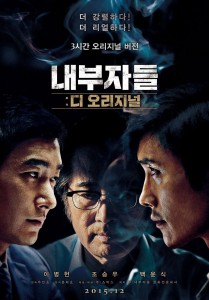


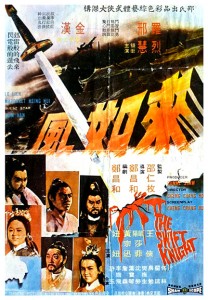
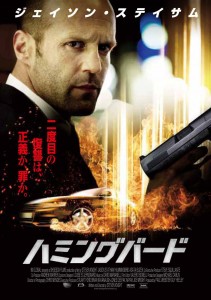

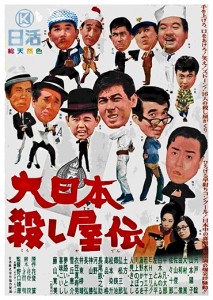

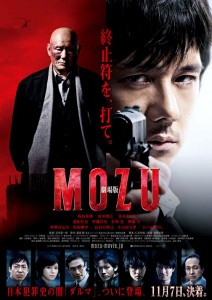



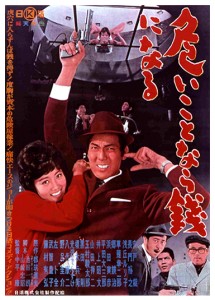
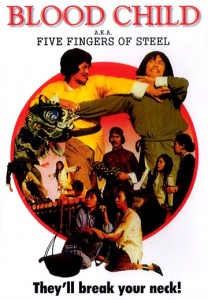




12 Comments